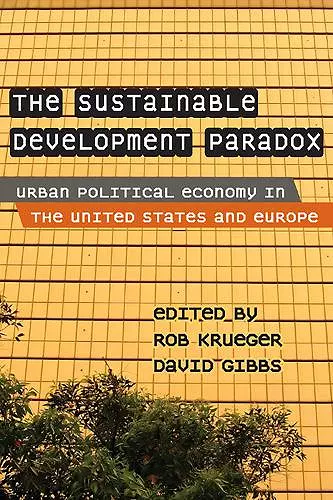The Sustainable Development Paradox
Urban Political Economy in the United States and Europe
David Gibbs editor Rob Krueger editor
Format:Paperback
Publisher:Guilford Publications
Published:11th Oct '07
Currently unavailable, our supplier has not provided us a restock date

Sustainability--with its promise of economic prosperity, social equity, and environmental integrity--is hardly a controversial goal. Yet scholars have generally overlooked the ways that policies aimed at promoting sustainability at local, national, and global scales have been shaped and constrained by capitalist social relations. This thought-provoking book reexamines sustainability conceptually and as it actually exists on the ground, with a particular focus on Western European and North American urban contexts. Topics include critical theoretical engagements with the concept of sustainability; how sustainability projects map onto contemporary urban politics and social justice movements; the spatial politics of conservation planning and resource use; and what progressive sustainability practices in the context of neoliberalism might look like.
Through detailed case studies, this innovative book critically assesses the contradictory relationship between neoliberalism and sustainability. Addressing environmental as well as social implications of neoliberalism, the contributors take a specifically geographical approach. They show not only that what counts as sustainable depends on the local context, but also that interdependencies across geographic scales and connectivities between places can compromise the viability of local sustainability strategies. This volume will contribute substantially to our understanding of the nature and possibilities of sustainable cities in an era of local entrepreneurialism.--Eric Sheppard, Department of Geography, University of Minnesota
This book is a clarion call to engage with the politics of sustainability. Much needed and highly welcome, this volume challenges prevailing myths, transforms the sustainability debate into a discussion of democracy, and prods policymakers to transcend the politics of the possible. Through clear and convincing arguments grounded in real-world cases, the book asks: Whose sustainability, through what process, for whose benefit? This ideal text will stimulate students in courses on environmental policy, political ecology, political theory, and international development.--Robert W. Lake, School of Planning and Public Policy, Rutgers University
Looking at the debate through lenses that combine the conceptual and the empirical, this volume astutely navigates the growing, multiscalar interest in sustainability within the context of current capitalist social relations. Asking fundamentally political questions, such as 'What sort of natures do we wish to inhabit?', the contributors use a variety of cases to interrogate the sustainability 'problematique' with clarity and vigor.--Julian Agyeman, Department of Urban and Environmental Policy and Planning, Tufts University
This book addresses--in a manner that is appropriately both dispiriting and inspiring--the paradox of sustainability in a postpolitical age. While 'everyone knows' that 'nature' faces coming calamity, opposed social forces dispute its causes and struggle over which 'natures' to protect; how, when, and where to do so; and at what price and whose cost. Many excellent contributions explore aspects of this paradox, its economic and political background, and its material and discursive expressions, and consider radical policy alternatives and practical solutions. A 'must read' for those interested in critical political ecology.--Bob Jessop, Department of Sociology and Director, Institute for Advanced Studies, Lancaster University, UK
A much-needed, 'second generation' analysis of the complex social processes involved in the governance of sustainable development, as viewed through a scalar perspective, including at the urban and regional levels. The strengths of this book lie in its theoretical exploration of the ways in which the concept of sustainable development can inform spatial planning, and in its analysis of well-presented case material. The wide-ranging empirical focus spans both sides of the Atlantic, with particular emphasis on North America, the UK, and Spain. The book is both theoretically probing and empirically well grounded, making for a rich and rewarding read. With empirical evidence drawn from across urban planning, conservation, and natural resource management, this book will be of interest to both undergraduate- and graduate-level students in environmental policy, human geography, and city and regional planning.--Susan Baker, Cardiff School of the Social Sciences, Cardiff University, UK
- The book makes an important contribution to understanding the politics, possibilities, and contradictions of sustainable development. --Economic Geography, 9/1/2007ƒƒ A comprehensive volume....Brings together work by several critical geographers, posing strong theoretical engagements with notions of sustainability and joining them with several empirical examples....This excellent volume provides a much-needed starting point for critical engagements with sustainability. Bringing together the economic and social structures that influence processes of sustainability, this work acts as a resource for urban geography and planning. As well, this volume questions the multiple constructions of nature and is an excellent starting point for scholars and students of urban political ecology and anyone interested in the interplay of contemporary social relations with nature and economy. --Cognitive Neuropsychology, 9/1/2007
ISBN: 9781593854980
Dimensions: unknown
Weight: 400g
310 pages